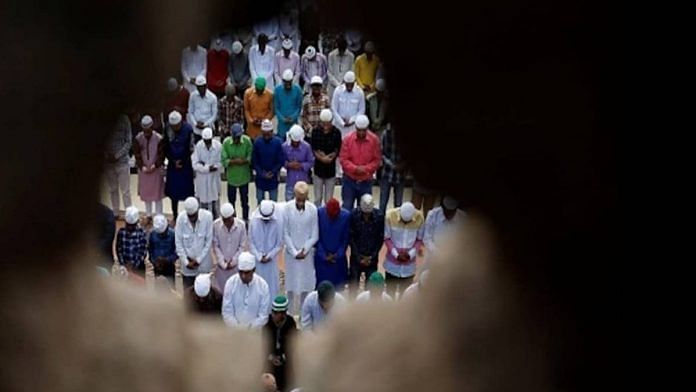As the results of assembly elections came last week, the BJP made a roaring comeback to three major Hindi heartland states. There was the usual lack of self-introspection in the Congress, which its ideological opponents and journalists were quick to point out. However, what most critics didn’t notice was prominent Muslim figures’ failure to self-introspect — they were busy bashing the “wrong kind of Hindus” who voted for “communal BJP”. Such consistent hate will do no favour to Indian Muslims. They can keep blaming the BJP for all their grievances, but the facts state otherwise. Neither the BJP nor the Congress is responsible for the abysmal socio-economic plight of 20 crore Muslims in the country. Most of our problems are creations of our own mindsets of ghettoisation.
Today, intellectuals are constantly engaged in exploring the poignant narrative of marginalised Muslims in a predominantly Hindu India. As a Pasmanda Muslim, my perspective diverges significantly from the dominant narrative.
We’re not a monolith
A critical mistake that most commentators make is to see the Muslim community as a monolith and neglect the nuances. The perception of a homogenous Muslim population broke with the Mandal Commission report, which, for the first time in India’s history, put a spotlight on the caste hierarchy within the community. It brought out the ground realities of caste-based discrimination among Muslims, which most Indians were oblivious to.
Our community harbours a unique cultural reality, often overshadowed by the kufu doctrine that perpetuates Ashraaf supremacy. The term ‘kufu’ loosely translates to ‘similarity’ of social status and is used to determine marital compatibility. Such a criterion has led to a larger pattern of exclusion of Pasmanda Muslims from positions of power, prestige, and privilege. Moreover, it is a double marginalisation of sorts — a group sidelined within a community that is itself a minority in India.
As a result, in the larger fight for equality for Muslims, Pasmandas’ rights get neglected. And this is a group that makes up 85 per cent of the Muslim population in the country.
An illustrative instance is the unequal application of the right to education in Muslim minority institutions, which deny underprivileged Pasmanda students an opportunity to obtain a good education. Additionally, reservation benefits for lower castes are absent in minority universities like the Aligarh Muslim University (AMU), where Ashraafs are over-represented and Pasmandas number only a few. This systemic exclusion of Pasmandas contributes to alarming socio-economic disparities in the broader Muslim community.
Also read: China’s erasure of mosques shows Muslims can only thrive in nations like India
Backward through the years
Take a look at how bleak the reality is.
The 2011 Census mentioned that the literacy rate among Muslims stood at 68.54 per cent — lower than that of other minority groups such as Christians, Jains, Sikhs, and Buddhists. Despite comprising 14 per cent of India’s population, only 4.6 per cent of Muslim students are enrolled in higher education institutes. While one may point to welfare schemes and state-provided benefits, the reality is that other communities are achieving better outcomes with similar resources.
On a more molecular level, the madrasa system restricts Muslims’ access to modern scientific education. Despite the Quran’s first verse, ‘Iqra’, translating to ‘read’, rarely do we hear maulvis encouraging education in Friday sermons. They even discourage women’s education by propagating that it would bring doom to Muslims. All their focus is mostly on politics — and not the betterment of the community as a whole.
A society held captive by regressive and patriarchal interpretations by the clergy is unlikely to foster a mindset conducive to progress. Such a community is poised to lag on developmental parameters, hindered by a restrictive worldview that stifles innovation and inclusivity. Breaking free from the grip of such interpretations is essential to pave the way for a more progressive and forward-thinking society.
A dearth of higher education among Muslims also translates into their low participation in the job market. Data for the past few years reveals that only about 5 per cent of Muslims qualify for UPSC examinations. Data for Muslims’ enrollment into higher institutions also paints a depressing picture.
Also read: AMU asked for certificates proving students are Ashraaf till 1947. Nothing has changed
Muslim women have it worse
A significant factor contributing to the Muslim community’s lag in progress is gender inequality. When half of the population is denied equal rights, fair treatment, and access to education, society regresses and remains backward. Muslim women face discrimination under the Muslim Personal Law, which denies them equal rights, particularly in terms of inheritance. The preconceived gender roles limit the importance given to women’s education and hinder their economic contributions to the family.
Moreover, leaders who claim to represent the Muslim community often lack commitment. All India Majlis-e-Ittehad-ul-Muslimeen (AIMIM) chief Asaduddin Owaisi cries hoarse about Muslims’ rights but his constituency — Hyderabad, with 43 per cent Muslims — has the second-largest urban poor populace in India. A 2020 survey by NGO Helping Hand disclosed that 63 per cent of Hyderabad’s Muslim households are poor. But Owaisi faces minimal criticism for this underperformance. To youngsters questioning why they should vote for him, he had no answer.
Owaisi has even opposed reservations for Muslims in Andhra Pradesh. It is ironic that a leader who frequently blames the Hindu majority for the challenges faced by Muslims is hindering policies that could potentially uplift the economically disadvantaged segments within the community.
The sincerity of such leaders then comes under doubt. In a scenario where leaders evade accountability and secure votes through fear-mongering or communal tactics, the prospects for societal improvement remain uncertain. The community must reflect on the criteria guiding their votes and the factors influencing their choice of leaders.
Amana Begam Ansari is a columnist and TV news panelist. She runs a weekly YouTube show called ‘India This Week by Amana and Khalid’. She tweets @Amana_Ansari. Views are personal.
(Edited by Humra Laeeq)



